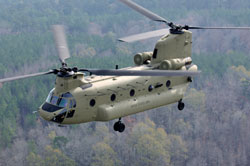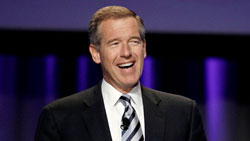Brian Williams, anchor and managing editor for NBC Nightly News, has been the subject of the news himself as of late. Williams’ journalistic integrity has been questioned as a result of a fallout from a Jan. 30 broadcast in which Williams recounted riding in a Chinook helicopter that was shot down during the Iraq War in 2003.
After the broadcast, Williams was blasted by veterans who were actually on that mission, stating that he was on a different helicopter on a separate mission an hour behind.
The Jan. 30 broadcast covered a public tribute for recently retired Sergeant Major Tim Terpak, a New Jersey native, who was assigned to security for the NBC News crew at the time of the alleged incident. During that broadcast, Williams stated, “The story actually started with a terrible moment a dozen years back during the invasion of Iraq when the helicopter we were traveling in was forced down after being hit by an RPG.”
Williams has told variations of this story over the years, including one in which the pilot, Richard Krell, received a Purple Heart for his injuries. Veterans who were involved in the incident have since vocally blasted Williams.
Further, Krell never received the Purple Heart, as evidenced by the absence of his name from the Purple Heart Recipient database. He also allegedly did not pilot the Chinook on which Williams and the NBC crew were riding. Other veterans, including flight engineers Joseph Miller and David Luke, as well as pilot Allan Kelly who say they actually flew Williams’ helicopter, reported that Williams was not even on that particular mission, was never fired upon, and was on a two-copter mission about an hour behind the Chinook that had been hit.
Williams initially issued an apology on Facebook, blaming his fuzzy memory on the 12-year time span. Williams wrote, “I was indeed on the Chinook behind the bird that took the RPG.” When further pressed that he was not even on that mission, Williams told Stars and Stripes in an interview on Feb. 4 that he was confused, that he misinterpreted the events because he was a scared civilian.
Williams said, “I did what a civilian, an untrained civilian, would do in that instance and it was being scared. I think anyone in my shoes would admit that. It could not have been a more foreign environment. All we knew is we had been fired upon. All we knew was we had set down and then with the arrival of the sandstorm, how do we defend our little desert bivouac area.”
 According to the other participants, however, the only accurate part of Williams’ story is that his two-Chinook mission was forced to land due to the sandstorm, and they landed at the makeshift camp created by the downed Chinook from the earlier mission.
According to the other participants, however, the only accurate part of Williams’ story is that his two-Chinook mission was forced to land due to the sandstorm, and they landed at the makeshift camp created by the downed Chinook from the earlier mission.
As the story unfolded, it appeared that Williams’ embellished the events in order to place him in a dangerous situation in which he actually did not participate.
Professor Melissa Ziobro, instructor of history and coordinator of the Student Veteran Oral History Project, said, “Of course, memories are fallible—but my experience interviewing dozens of active duty military personnel, veterans, AND forward deployed civilians has been that, if anything, they tend to DOWNPLAY their experiences, compared to what they are credited with in after action reports, awards citations, etc.” Ziobro further observed that Williams tended to get into “trouble” when he was “entertaining” a crowd and noted that “it’s interesting to consider how the audience influences storytelling.”
Williams’ credibility has since been questioned. Stories Williams covered during Hurricane Katrina in 2005 and Israeli’s war with Hezbollah in 2006 have come under scrutiny. Kelly Coffey, a junior communication major, noted that Williams has become the subject of class discussions, including her most recent critical discourse class, in which the students were challenged to explain who will be affected by this scandal—Williams’ himself, or the entire NBC News network.
Coffey said, “Brian Williams is ultimately responsible for his own reporting,” but noted that her class was split on the topic, with about half of the class agreeing that NBC’s credibility will also take a hit.
NBC has since suspended Williams without pay for six months while they do a thorough investigation, acknowledging that Williams’ “misrepresented” the Iraq War incident and added that this has happened “on other occasions… in other venues,” as noted by the official NBC statement.
Masters in history student Molly Kline agreed that the suspension is appropriate, and added that NBC needs to do a thorough investigation, and if they should choose to reinstate Williams, NBC needs to make sure that there is transparency in telling the public what the investigation uncovered. After all, Kline noted, “He is the face of the news division.”
IMAGES COMPILED by Brandon Johnson




